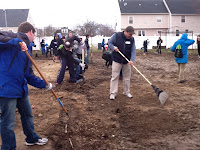The
main mitzvah of the Seder is to tell the story of Pesah to your
children. This theme gets expressed in many different ways throughout the
course of the evening. There are four pivotal questions, four unique children,
and a great search for the afikomen. It is a time for families to come
together, both physically and spiritually. College children arrive by car, bus,
plane, and train, and adult children – sometimes with their own babies in tow –
return home. Even Yizkor, which is said on the last day of Pesah, helps
us give life to the loved ones we have lost, continuing their connection with
our family.
Through
our families we are afforded an opportunity to reflect on the essential
messages of this holiday. We need to remember that we are human, we are alive,
we must live, and we can never take our freedom for granted. We must reflect on
the plague of poverty and on our responsibility to care for the neediest
members of our society. We think about the importance of family, our individual
and collective histories, Jewish values, and the importance of education and
learning in our tradition. All of these concepts help compose the story of Pesah.
A
central focus of Judaism is turning Jewish values into sacred acts, and moving
forward to ensure a future. Ultimately, it is this network of sacred deeds that
provides the path to holiness and goodness through ritual living – learned
through the family.
We
know that our Seder conversations have been successful when they translate into
deeds of Tikkun Olam. This week, I have been delighted by the hands-on proof
that the themes of the Seder resound for the next generation in the remarkable
Alternative Spring Break program developed by Rabbi Dave Levy and his dedicated
staff at United Synagogue Youth (USY).
Today is Day Two of the Alternative Spring Break
program of USY which organized a hands-on relief program over Chol Hamoed Pesah
in order to assist in sections of New Jersey devastated by Hurricane
Sandy.
Starting yesterday, 83 teenage USYers from
13 of the 17 USY regions came together
to do hands-on work in Union Beach, NJ,
forgoing more common vacation activities and destinations. The teens will stay
over in the community for Shabbat (the Jewish Sabbath) where study will center
on text study about Jewish responses to natural disasters and on the importance
of Tikkun Olam, which President Obama spoke about in his historic Jerusalem
speech last week. The Shabbat portion of the weekend will also include communal
prayer, singing and festive meals.
Yesterday saw the teens working in rainy, windy
weather with shovels, hoes and other tools in the lots of private homes in
Ocean City that had been destroyed by the storm back in the fall, after they
were briefed about the unique devastation to the Ocean City community. They
also did park clean-up. After they finished, they went to Congregation Torat-El
in Oakhurst for dinner and to hear from communal leaders, rabbis and other
speakers on the dimensions of the destruction wrought by the storm. They spent
the night in the synagogue in sleeping bags. The food provided for the teens is
strictly Kosher for Passover.
Today, the USYers will be working at another
site from 9 am until early afternoon. The Alternative Spring Break is supported
in part by Repair the World. Congregation Torat-El in Oakhurst, NJ is hosting
the teens for the duration of their visit.
Just as Rabbi Abraham Joshua Heschel famously
spoke of “praying with his feet” when he marched for civil rights, I call the
work of our USYers “conversing with their hands.”
The fact that so many of our teens (and many
more would have come if we could have accommodated them) chose this activity
for their long-awaited spring break is proof that the lessons of the Seder are
being passed on to the next generation.
Reflecting on the values of our young people as
we prepare for Shabbat, I believe we are entitled to a moment of “Dayeinu.”
They have earned their place at the great Jewish communal table and we eagerly
await the conversations we will share in the future.
Shabbat Shalom and Chag Kasher v’Sameach!

